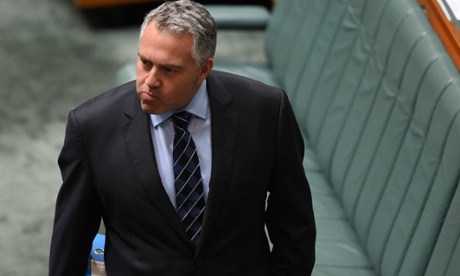Labor calls the changes a ‘tax on sick Australians’ and fears they will be pushed through by bypassing parliament

The government may be about to bypass parliament and push through the controversial Medicare co-payment scheme in a “sneaky backdoor move”, the opposition has claimed.
Labor has highlighted a message from the health department to medical practice software companies telling them to prepare to incorporate changes to accommodate the $7 payment.
The opposition says any move to impose “a tax on sick Australians” should be ruled out unless it is “put to the people”.
At the same time, the Abbott government is facing a budget crisis as the treasurer, Joe Hockey, warns of falling revenue combined with a Senate logjam on the Coalition’s budget cuts, leaving a bigger financial hole.
“It’s not so much a [budget] hole,” said Hockey, “as a case of … falling revenue, but it’s not about panic, it’s not about responding with a whole range of further cuts, it’s about ensuring that we recognise what the problem is.”
Even though the Medicare legislation has yet to be introduced in parliament, the health department has reportedly written to software companies informing them changes were required to ensure medical practices can check when a concessional patient has reached 10 visits to a GP, pathology or diagnostic imaging service.
Hockey refused on Thursday to rule out bypassing parliament to implement the $7 co-payment, defending budget cuts such as the deregulation of higher education fees.
“I am not going to speculate on what the outcome is,” he told the ABC.
Hockey admitted the government was facing a sharp drop in revenue, which will be outlined in the Mid Year Economic and Fiscal Outlook, due in December.
“If we make a contribution now through a copayment on Medicare or through a range of other initiatives including higher education fee deregulation, if we make that contribution now we will get the benefit in the future as a nation,” Hockey said.
The government has failed to get through a number of its budget measures in the Senate, including a petrol indexation rise, the deregulation of higher education fees, the Medicare co-payment and the changes to the rules around unemployment benefits.
Three weeks ago, the government announced it would bypass the Senate and introduce the petrol tax hike via a regulation, which would then have to be approved by the Senate retrospectively.
The government is facing a double whammy of revenue write-downs due to the fall in iron ore prices combined with the failure to get budget cuts through the Senate. Labor, the Greens and the Palmer United party have all pledged to block the welfare changes, higher education deregulation and the Medicare co-payment.
The political situation is further complicated by PUP senator Jacqui Lambie refusing to pass any government legislation in protest against a below-inflation defence force pay deal, possibly causing a split within Clive Palmer’s party.
The opposition leader, Bill Shorten, said the Abbott government was up to their “sneaky old tricks” by not ruling out bypassing the parliament to “put a tax on sick Australians”.
“This is a government who doesn’t negotiate. They cajole and bully,” Shorten said.
“We say to the government, stick to what you said at the election. If you want to introduce taxes and changes and unfairness, take it to the people of Australia. Don’t do it through sneaky back doorman manoeuvres.”
Throughout the term of the Labor government, the Coalition said the budget problem was not lack of revenue but too much spending.
In his 2013 budget reply speech, then opposition leader Tony Abbott referred to the “supposed revenue shortfall” outlined by the former treasurer Wayne Swan, who said the failure to achieve surpluses was a result of falling government income.
“The treasurer spent much of his speech complaining that he was the victim of a sudden collapse in government revenue,” Abbott said at the time.
On Thursday, Hockey said the drop in revenue was a result of a 30% fall in iron ore prices since the budget and admitted he had not been conservative enough in estimating how far national income would fall.
“The iron ore price that we had in the May budget was below the consensus of the market. Previously Labor always over-estimated and then pretended to have a surplus.
“We were sceptical about market consensus and we took a lower price and you know what’s happened, it’s absolutely lower than that.”
A spokesman for the Department of Human Services, which administers the Medicare co-payment, said the proposed changes in medical software were not just related to the copayment but also resolved “a technical issue”.
“The implementation of all government measures, especially those involving ICT, require considerable forward planning. Even where legislation has not been passed, forward development work of this nature is standard procedure for the department.”
